Background

Incidents which can be seen as leading to the wars of the Three Kingdoms:
- Personal Rule - The period of 1629-1640 where King Charles I ruled without recourse to Parliament.
- Jenny Geddes starts riot in Edinburgh - Incident in 1637 starting protests over the use of the Book of Common Prayer by the Church of Scotland.
- Signing of the National Covenant - 1638 declaration to defend the Church of Scotland from the reforms of King Charles I


